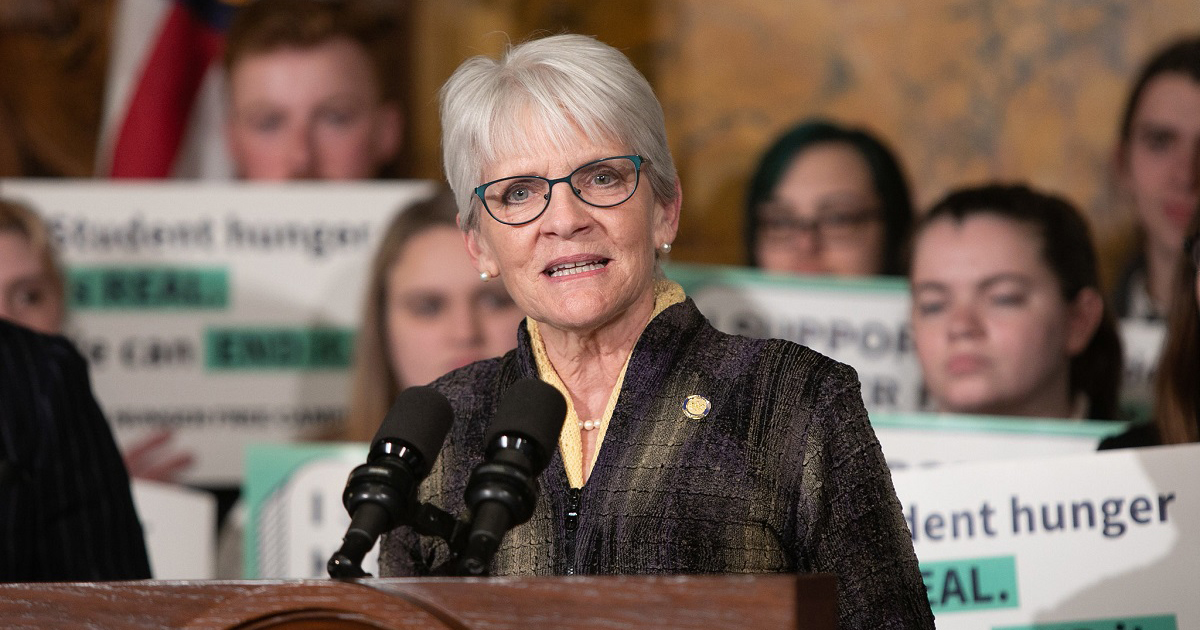
Senator Comitta speaks to a group of more than 100 college students, including representatives from West Chester University, who visited the state Capitol in Harrisburg this spring to rally in support of Hunger-Free Campuses Program. Thanks to their work and that of others, the program was funded with a $1 million appropriation in the 2022-23 state budget.
WEST CHESTER, PA − August 1, 2022 – A new initiative to tackle the growing problem of food insecurity on Pennsylvania college campuses is being supported with $1 million in state funding, state Senator Carolyn Comitta said today.
The Hunger-Free Campuses Program, championed by Comitta, West Chester University (WCU) officials and others, will provide grants to colleges, universities, and community colleges that set up and expand free food pantries on campus and take other steps to meet the nutritional needs of students.
The initiative is based on legislation introduced in the state Senate by Comitta (Senate Bill 719) and in the state House by Representatives Malcolm Kenyatta and Jennifer O’Mara (House Bill 1363).
Comitta, who last fall brought together students, legislators, and hunger advocacy organizations to discuss the bill at WCU and tour the university’s free campus food pantry, noted that hunger on college campuses impacts a growing number of students across the state and nation.
“The issue of hunger and basic needs insecurity among college students impacts nearly every campus across all geographical regions and demographics,” Comitta said. “It impacts nontraditional college students, first-generation students, international students, those who relied on free or reduced-price meals throughout high schools, and others who have been impacted by rising consumer costs in addition to managing new financial responsibilities like housing, books, tuition, and more.”
“This is a solvable problem. It is a bipartisan issue. I am glad that our solution received bipartisan support in the state budget. And, as West Chester University alumnus, I am proud that the university continues to be a leader in this and other areas of social equity in campus communities,” she added.
According to national studies cited by the Wolf administration, about 1/3 of college students report missing meals due to food insecurity, nearly 35 percent of college students know someone who has dropped out due to food insecurity, and more than 50 percent of students who faced food or housing insecurity in 2020 did not apply for support because they did not know how.
In addition to supporting colleges and universities that establish campus food pantries, the Hunger-Free Campuses Program aims to increase Supplemental Nutrition Assistance Program (SNAP) outreach, improve data gathering, and support innovative programs that address food insecurity on campus. One such program, championed by the national student hunger advocacy organization Swipe Out Hunger, calls for allowing students to donate their unused meals or “swipes” from pre-purchased meal plans to those who face food insecurity
“As Pennsylvania college students return to campus in the fall – over 1/3rd will be fighting food insecurity, rising housing costs and endless inflation,” said Robb Friedlander, Director of Advocacy with Swipe Out Hunger. “With the Hunger Free Campus Act, strong leaders like Sen. Carolyn Comitta have shown that Harrisburg will not stand by as the next generation fights through this adversity but will support them to create a stronger state where every student can thrive.”
At WCU, about 200 students a week access the Campus Resource Pantry, which offers non-perishable food, fresh produce from campus gardens, personal care items, school supplies, and winter and career clothing. It is open to all undergraduate and graduate students regardless of need level.
“West Chester University and many other colleges and universities have invested in programs and resources to support students experiencing food insecurity, but food insecurity among college students remains an enduring social equity problem across the commonwealth and across the country,” said Ashlie Delshad, a WCU professor and a founder of the WCU Campus Community Garden, and Seth Jacobson, Senior Director of the WCU Center for Civic Engagement and Social Impact. “Colleges and universities cannot solve this problem on their own, which is why the recent approval for funding the Hunger Free Campus Bill in PA is so important. We are also hopeful that additional policy supports at both the state and federal level will build off this landmark program.”
